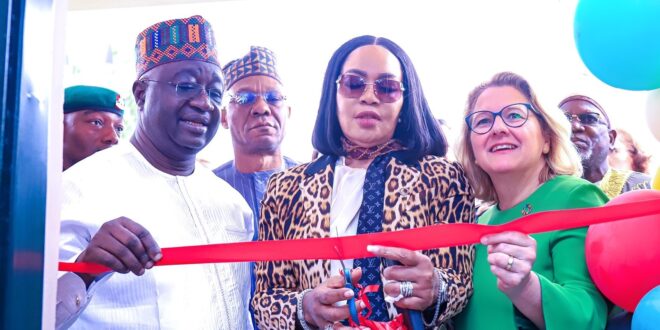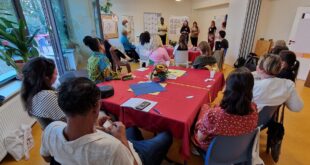Germany and Nigeria have established a new migrant resource centre on the outskirts of Abuja. The German government hopes to make migration successful for both countries involved.
On Tuesday, German Development Minister Svenja Schulze opened a new Migration Resource Centre in Ado, a densely populated area near Nigeria’s capital, Abuja.
The centre, funded by Germany, is part of a strategy to offer information and employment advice to young people in Nigeria.
Nigerians are leaving the country in increasing numbers. Many make the dangerous journey to Europe by crossing the Sahara Desert and the Atlantic Ocean or the Mediterranean without the required paperwork or having secured employment beforehand.
The Migration Resource Centre provides counseling, support and employment advice to Nigerians who intend to migrate to Europe and offers advisory support for Nigerians in Germany and Europe who want to relocate back to Nigeria.
“Migration is a reality that needs to be shaped so that it can benefit everyone, the people who migrate, the country of origin and the host community,” Schulze told DW. “That’s what this cooperation is all about: making migration successful for Nigeria and Germany.”
Migration Resource Center yielding results
Nigeria’ Minister of State for Labour and Employment Nkeiruka Onyejeocha described the centre’s inauguration as a significant milestone in the partnership between Nigeria and Germany.
“Due to the growing economic and demographic factors, which suggest that we are in an age of growing migration pressures, the Federal Ministry of Labour in partnership with the GIZ Center for Migration and Development established this Migration Resource Centre here in Ado, Nasarawa State, which is the advisory migration centre for people wishing to migrate to Germany, Europe, or within their region via regular channels to work or continue their education outside their country,” Onyejeocha told DW.
Nigeria is looking forward to the promotion of labour exchange with Germany through bilateral labour migration agreements, she added.
The GIZ, which is funded by the German government, has been collaborating with Nigeria on several migration projects. According to Onyejeocha, this has provided individual support to a total of 320,000 people in areas of employment, grants, counseling and psychosocial support. Some 37,000 of them have gained employment, and about 57,000 have received startup grants.
Zarah Muhammad is among these beneficiaries. “I have benefited from the centre because I was trained as a tailor here, the Migration Centre for Development supported me. I now work and train other women,” she told DW.
Pursuing dangerous dreams
Nigeria is one of the countries facing challenges of irregular migration to Europe because of poverty, a low standard of living and insecurity.
The Nasarawa State government also works with the Migration Centre to promote regular migration.
‘’This time, migration often is associated with hurdles on one hand and opportunities on the other. Because of these reasons, the government evolves measures at all levels towards addressing this issue of migration,” said Deputy Governor of Nasarawa State Emmanuel Akabe.
Schulze visited a skill acquisition centre funded by the German government as part of its contribution to training young Nigerians to start their own businesses.
Schulze emphasized that migration promotes economic prosperity and strengthens trade relations between countries, benefiting everyone involved.
“Nigeria is one of the countries from which relatively large numbers of people migrate to Europe irregularly,” she said. “Many people are not aware of the risks involved; they often put their trust in false promises or in exaggerated social media posts about supposed success stories. The advice provided in the centres is meant to ensure that people interested in migrating are able to make well-informed decisions.”
In addition to Nigeria, Germany has migration and development centres in Egypt, Ghana, Iraq, Morocco, Nigeria, Pakistan, Tunisia and Jordan.
© DW
 THE AFRICAN COURIER. Reporting Africa and its Diaspora! The African Courier is an international magazine published in Germany to report on Africa and the Diaspora African experience. The first issue of the bimonthly magazine appeared on the newsstands on 15 February 1998. The African Courier is a communication forum for European-African political, economic and cultural exchanges, and a voice for Africa in Europe.
THE AFRICAN COURIER. Reporting Africa and its Diaspora! The African Courier is an international magazine published in Germany to report on Africa and the Diaspora African experience. The first issue of the bimonthly magazine appeared on the newsstands on 15 February 1998. The African Courier is a communication forum for European-African political, economic and cultural exchanges, and a voice for Africa in Europe.




























